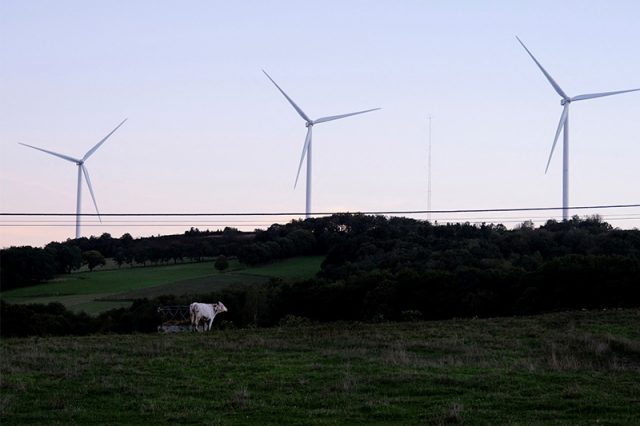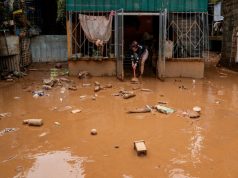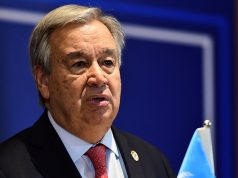
- IPCC says rapid, deep emissions cuts needed to stay below 1.5C
- Urges people to act in self-interest for health, wellbeing
- Choices this decade will have impacts for thousands of years
OSLO, March 20 (Thomson Reuters Foundation) — Climate scientists on Monday appealed directly to everyone on the planet to seize a dwindling chance to limit global warming to 1.5 degrees Celsius (2.7 Fahrenheit) or risk harming people living today and their descendants for thousands of years.
With graphics showing individuals – from babies to pensioners – set to suffer ever more from rising heat, the report by the U.N.’s Intergovernmental Panel on Climate Change (IPCC) gives a more personal twist to findings about looming threats than its past studies directed at governments.
“There is a rapidly closing window of opportunity to secure a liveable and sustainable future for all,” the report said.
“The choices and actions implemented in this decade will have impacts now and for thousands of years,” it added, pointing to long-term risks like desertification and rising sea levels.
U.N. Secretary-General António Guterres welcomed the report as a guide for defusing what he called a ticking “climate time bomb”.
RELATED: ‘Climate time bomb ticking’, emissions must urgently be cut —UN chief
“Our world needs climate action on all fronts – everything, everywhere, all at once,” he said at the report’s launch.
Governments have fallen far short of pledges in the 2015 Paris Agreement to limit heating of the climate by shifting off fossil fuels, amid crises including COVID-19, Russia’s invasion of Ukraine, food shortages and strained ties between China and the United States, the top two greenhouse gas emitters.
The IPCC summary for policymakers, condensing thousands of pages of climate science in six mammoth reports published since 2014, is sprinkled with references to healthier lifestyles, such as cycling, walking and diets rich in fruits and vegetables with less high-carbon meat.
It also outlines the surging risks to mental health from a warming climate.
“We brought in the human side” of climate change, Hoesung Lee, chair of the IPCC, told a news conference, saying it was a major shift since the last IPCC policy document in 2014 which had few references to individuals and their behavior.
Peter Thorn, one of the IPCC authors, said it was time for everyone to accept a share of responsibility.
“We at all levels – governments, communities, individuals – have made climate change somebody else’s problem,” he added.
The report was approved after a week-long meeting of scientists and governments in Interlaken, Switzerland, to negotiate the text.
It reiterates previous IPCC findings that it is “unequivocal” that humanity is to blame for climate change.
But notably, in a difference from earlier reports, it shows “high” or “very high” confidence from scientists about the scale of coming risks and the shrinking opportunities to address them.
The IPCC also appeals to people’s self-interest, saying that action to combat climate change by shifting to clean energy makes sense for health and wellbeing, in what delegates said was partly an attempt to win over those who doubt the science or economics.
Walking, cycling
“Access to clean energy and technologies improves health, especially for women and children; low-carbon electrification, walking, cycling and public transport enhance air quality, improve health, employment opportunities and deliver equity,” the report said.
“The economic benefits for people’s health from air quality improvements alone would be roughly the same, or possibly even larger than the costs of reducing or avoiding emissions,” it added.
It said the planet has warmed by 1.1C above pre-industrial times and is on track to breach 1.5C – a threshold for ever more disastrous impacts – between 2030 and 2035 on current trends.
The Paris Agreement seeks to limit warming to “well below” 2C while “pursuing efforts” for 1.5C.
“Limiting warming to 1.5C and 2C involves rapid, deep and in most cases immediate greenhouse gas emission reductions,” the report said, warning that overshooting 1.5C could trigger impacts such as an irreversible thaw of ice sheets that would push up sea levels.
One illustration in the report shows how risks – including droughts, fires, sea level rise and heatwaves – will climb steadily during a person’s lifetime.
A colored background shows low risks with a cool blue, through beige and orange and ending with red and purple at the hottest, riskiest future in the second half of the century.
Someone born in 1950, for instance, is shown living mostly in a benign beige, for instance, only facing an orange level of risk in 2020, while holding a walking stick at 70. A baby seen crawling in 2020 will quickly move from orange to a lifetime of red and purple risks as they age to 70 in 2090.
“It’s all hands on deck. What matters is human lives and futures, the liveability of this planet,” said Kaisa Kosonen, who led the Greenpeace delegation in Interlaken. “There is a role for everyone.”
The report, she added, is a “final warning” from the IPCC for action to avert 1.5C.
The IPCC also sees better protection of nature as a crucial part of measures to tackle climate change and protect people.
As emissions rise, forests, coral reefs and the thawing Arctic are at risk of “extinctions and an irreversible loss of biodiversity” – and those changes threaten key natural systems people depend on, such as rainfall for water security and farming, the report said.
COP28
The report will guide the next annual U.N. climate summit in Dubai, known as COP28, in December. The conference is due to give a first “stocktake” of climate action under the Paris pact.
Oliver Geden, an IPCC author at the German Institute for International and Security Affairs, said the IPCC report, for the first time, includes an estimate that global greenhouse gas emissions will have to fall 60% from 2019 levels by 2035 to safeguard the 1.5C goal.
The year 2035 is the next horizon for national climate action plans, which mostly now stretch to 2030.
A previous IPCC report already set a benchmark for cuts in greenhouse gas emissions by 2030, of 43% below 2019 levels, to have a 50% chance of keeping warming to 1.5C.
But such cuts are, so far, theoretical.
Global energy-related carbon emissions rose almost 1% in 2022 to a new record high, according to the International Energy Agency. And temperatures are currently on track to reach 2.7C by 2100 with current policies, according to a Climate Action Tracker compiled by scientists.
Delegates at the Interlaken talks said Saudi Arabia and other oil producers had resisted calls by vulnerable nations, including small island states at risk of rising seas, for more explicit language in the report summary calling for a phase-out of coal, oil and gas in favour of renewable energy.
But it still includes strong points in favour of renewables.
In one graphic, for instance, solar and wind top a list of affordable options for curbing emissions, with nuclear and carbon capture and storage of emissions from fossil fuels at the bottom. Unit costs of solar energy have tumbled by 85%, and wind by 55%, from 2010-19, it says.
The report also highlights the inequity of the world’s planet-heating emissions, noting that the 10% of households with the highest per-capita emissions contribute 34–45% of global emissions linked to consumption, while the bottom half are responsible for only 13-15% of the total.
Madeleine Diouf Sarr, chair of the 46-strong group of least developed countries, called for rapid action on a new fund to help poor nations cope with climate-driven loss and damage.
This month, Cyclone Freddy killed more than 500 people in Malawi, Mozambique and Madagascar. Last year, floods in Pakistan caused more than 1,700 deaths and economic losses of more than $30 billion.
“We are not doing enough, and the poor and vulnerable are bearing the brunt of our collective failure to act,” said Diouf Sarr.
—Reporting by Alister Doyle; editing by Megan Rowling and Laurie Goering








